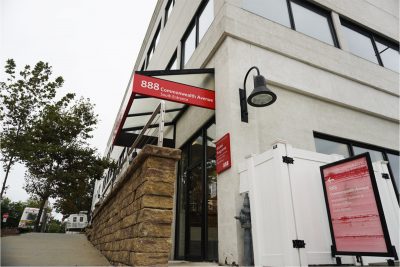
In light of the coronavirus pandemic, Boston University announced March 11 its decision to move all classes to a remote format until April 13 and asked that students not to return to campus after the conclusion of spring break.
In a letter from President Robert Brown and Jean Morrison, university provost and chief academic officer, the university-wide policy — which will be reassessed by April 1 — also stated that residence and dining halls will remain open for students who must stay on campus, many of them international residents.
Colin Riley, a BU spokesperson, said the university “recognizes that not everyone has the same ability to not return back to campus,” but the decision is inducing uncertainty among many of the over 10,000 international students enrolled at BU.
Delong Ye, a sophomore in the College of Communication, said BU’s choice to hold off on making a decision about what will occur after April 13 has been difficult for him.
“I was planning on going home to Shanghai this semester, but now I can’t,” Ye said. “It’s frustrating that [BU] won’t decide the entire semester’s plan until April 1.”
According to a COVID-19 FAQ posted by the university, BU is advising students arriving in the U.S. from countries identified as having a Level 2 and 3 risk by the Centers for Disease Control and Prevention — currently all foreign countries — to not return to campus “self-quarantine” for 14 days.
Self-quarantine is identified by the university as students returning to one’s “permanent residence.” For international students living on campus, this policy is difficult to abide by — especially for those whose home countries are under extremely tight travel regulations.
Miriam Pasarro, a senior in the Sargent College of Health and Rehabilitation Sciences and permanent resident of Italy, said even if she were able to return home, the 14-day quarantine she’d have to follow would prevent her from reintegrating.
“I don’t know if there are any flights going back to Italy these days,” Pasarro said. “If I do go back and classes resume on April 13, then I won’t be able to stay in my hall or go to class because I would have to quarantine myself.”
Riley said the International Students & Scholars Office is “integral” to issues regarding these travel restrictions and related matters, and is the primary point of contact for BU’s international student population.
Vridhi Sajnani, a senior in the College of Arts and Sciences and Questrom School of Business who holds a residence permit in the United Arab Emirates but is a permanent resident of India, said she is surprised with what she considers the ISSO’s lack of communication with international students on coronavirus-related information.
“In my four years, I’ve only met once with my ISSO advisor,” Sajnani said.
The Daily Free Press reached out to the ISSO, but they were unable to comment due to the large volume of inquiries and outreach they have received in recent days.
As for the university in general, Sajnani said she feels “in between” regarding the amount of support students are receiving for the COVID-19 crisis.
Among other concerns for the international students are the temporary closing of international borders, as well as limited access to digital education platforms.
The F-1 Visa international students receive to study in the United States does not normally include online education, but given the circumstances, the U.S. government has made exceptions.
Ye said this makes his situation complicated as the rules in place do not give breathing rooms for international students, despite their current authorization to attend online classes.
“If we go back to China right now, the government is making an exception for us to study online,” Ye said. “However, you have to be back within five months, or else you’re not allowed to study in the U.S.”
In some countries, access to broadband internet and Wi-Fi is limited. Additionally, differences in time zones mean international students could have to wake up as early as 4 a.m. to attend classes remotely.
The announcement of the switch attributes these circumstances as factors involved in its decision to keep campus residence and dining halls open. Sajnani said she feels there has been no clear indication from the university on penalties, should students be unable to meet these conditions.
“I wish there was more communication on how the class structure is gonna fit, because then we can base our decisions on it,” Sajnani said. “I haven’t even received information on it.”
Riley said the coronavirus FAQ points students to BU’s IT Help Center for support, and these circumstances will also be reviewed on a case-by-case basis, or between individual students and faculty members.
“In some cases, [IT Services will] suggest you speak directly with your professor on this issue and make them aware,” Riley said. “We are absolutely aware that there may be parts of the country without high-speed [internet] access, and certainly international students have some different issues.”


























































































































